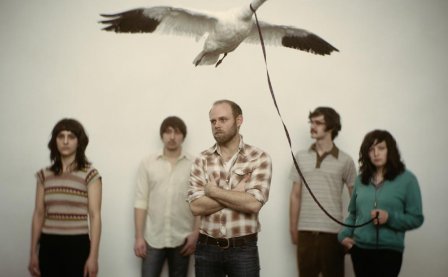It’s funny how music you’ve never heard before can elicit overwhelming nostalgia. From the moment you hear Portland-based Horse Feathers singer Justin Ringle’s croon on their latest album’s opener “Curs in the Weeds,” it’s hard to forget times of serene happiness in your life. It’s hard to forget times of youthful bliss, and it’s downright disturbingly difficult to forget the impact of young love — or maybe it’s just me.
Whether or not the lyrical content of House With No Home matches any of these memories is irrelevant — Ringle’s mumble conjures up surreal scenarios of Tracy Chapman doing Sam Amidon, minus any vocal enunciation; rather, it’s the otherworldly music that causes one to get lost in cerebral trauma while driving home alone at night. To be direct, the sound of this album is nothing short of beautiful. Peter and Heather Broderick’s string arrangements mimic Aaron Copland’s most tender moments, and over Ringle’s guitar strumming, the impact is enough to cause the White Witch’s icy heart to melt.
Listen to “Rude to Rile” and you’ll find a masterpiece of violin, cello, and percussion. I’ve listened to this track over and over again, and I felt as though my life story was being told: "He just waits/ And he hopes and he prays/ But the more she is loved she hurts." It makes me wish I had written it, because it feels like I mean it. Yet strangely, it still feels like it could be an old Appalachian folk song; I don’t know how, but it does. And it’s not as though love lost is my life story, but for a few minutes I’m convinced that it is.
The only real problem I have with this album is that it can begin to drag after a while. I feel like I need to be in the mood for it all the time, as the somber intensity of it can be a lot to handle track after track. There isn’t much of a change between the songs, but as a complete piece of art, it works seamlessly. It’s not ‘mushy’ or ‘whiny’ music by any means; it just delicately walks the tightrope between sad and hopeful. On “Albina,” Ringle demonstrates how a voice can be blended with music and find its own as an instrument, a technique that reaches its pleading peak on “Heather’s Kiss.” There are moments that can leave you bored, but there are moments where you can forget what you’re doing entirely. The songs beg to be heard, and the most you can do it listen.
If you like gorgeous folk, then this album is for you. If you don’t, well, The Hold Steady released something not that long ago.
More about: Horse Feathers




